18 Companies & Startups Revitalizing Travel in 2024

You may also like:
- Top Travel Industry Trends
- 20 Disruptive Transportation Startups
- 6 Important Hospitality Trends
The travel industry was one of the hardest hit industries during the pandemic.
In 2023, global tourism recovered, jumping back to 84% of pre-pandemic levels . Also, global travel and tourism revenue is expected to grow from $927.3 billion in 2024 to $1.1 billion by 2028.
However, the industry as a whole isn't expected to recover until 2027 .
Despite that, some travel startups are still growing exponentially.
Check out this list of companies that are looking to revitalize the travel industry in 2024 and beyond.

1. TravelPerk
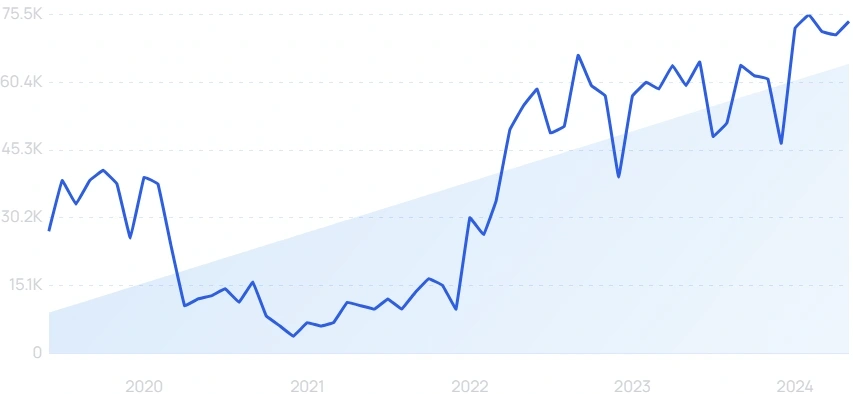
5-year search growth : 172%
Search growth status : Exploding
Year founded : 2015
Location : Barcelona, Spain
Funding : $530M (Series D)
What they do : TravelPerk is a travel management platform designed to simplify business travel. It offers a centralized platform for booking, managing, and analyzing business travel, with features such as real-time booking, expense management, and travel policy enforcement. The company aims to reduce the time and cost associated with business travel while providing a seamless and enjoyable experience for travelers.
In 2023, revenue grew 70% and gross profit 90% year over year as annual booking volumes reached $2 billion. The company also raised an additional $104 million in January 2024 at a valuation of $1.4 billion.
2. SafetyWing
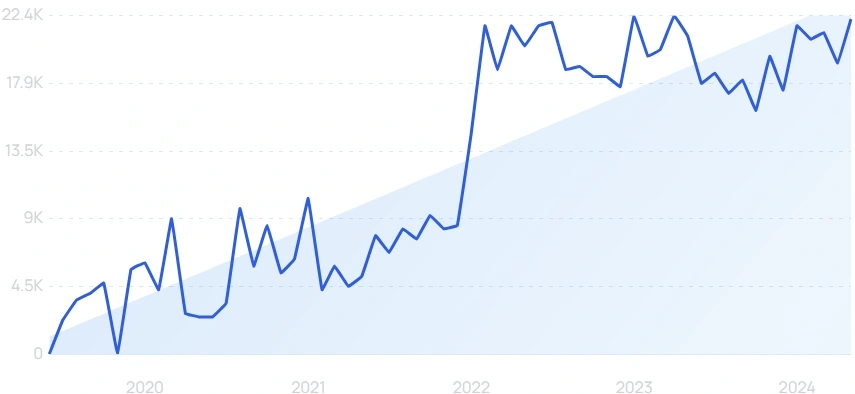
5-year search growth : 9,800%
Year founded : 2017
Location : Palo Alto, California
Funding : $47.1M (Series B)
What they do : SafetyWing is an insurtech company that focuses on digital nomads. Their flagship, "Nomad Insurance," is accepted across several different countries (ideal for travel). SafetyWing also offers a B2B "Remote Health" product that provides coverage for remote teams. In 2023, SafetyWing grew revenue to $20.3 million and served over 25,000 customers .
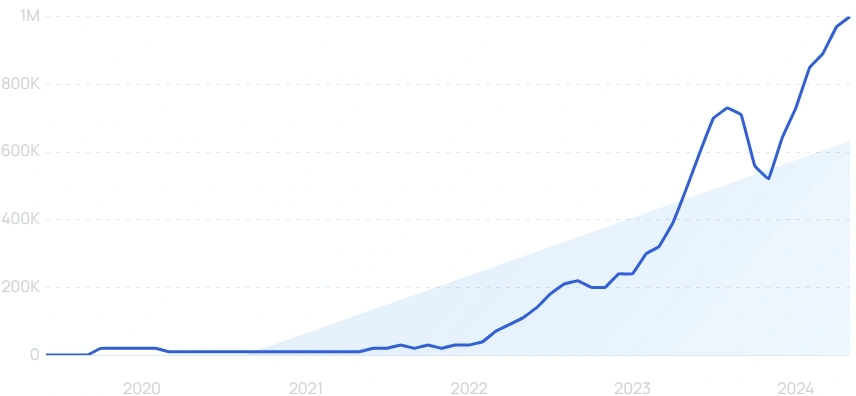
5-year search growth : 99x+
Year founded : 2019
Location : Singapore, Singapore
Funding : $67.3M (Series B)
What they do : Airalo is an alternative to using multiple SIM cards while traveling. Specifically, the company offers over 190 affordable "eSIMs" that can be switched over with a few clicks. eSIMs aren't supported by all smartphones, but they are becoming an increasingly common feature in newer models. The SIM company recently raised $60 million in its most recent series B funding round.
4. Roadsurfer
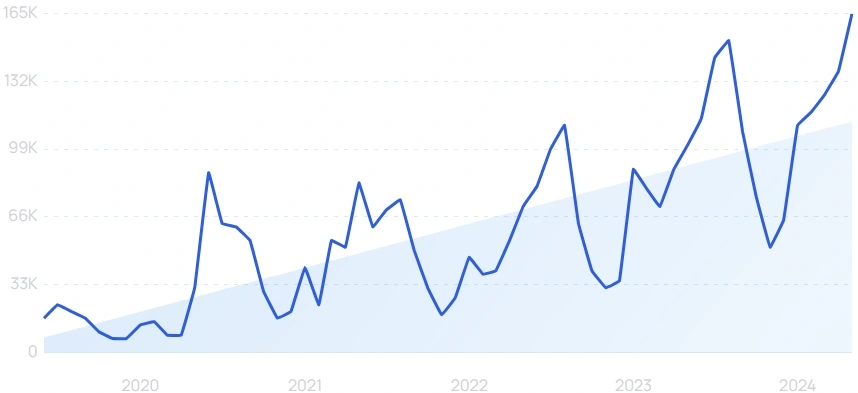
5-year search growth : 900%
Location : Munich, Germany
Funding : $33.9M (Series Unknown)
What they do: Roadsurfer rents customized camper vans in 13 European countries and, most recently, the United States. In addition to the core rental service, the startup offers a number of optional add-ons for each trip, like kitchen cutlery. Each plan also includes an insurance policy. Today, the company has 70 stations across Europe and North America .
5. YouLi (YouLive to Travel)
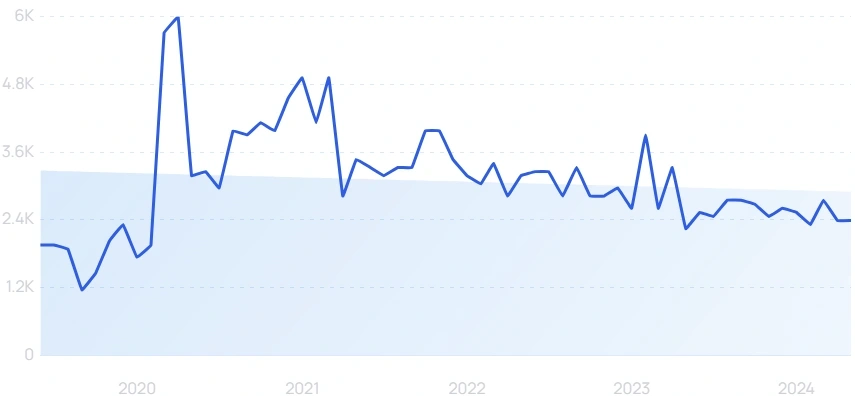
5-year search growth : 22%
Search growth status : Peaked
Year founded : 2016
Location : Melbourne, Australia
Funding : $200K (Angel)
What they do : YouLi is an all-in-one travel management software for organizing group trips and company retreats. The software includes a number templates for different types of travel itineraries. The software also has a member's area that travelers can use to manage and pay for their trips.
6. PickYourTrail
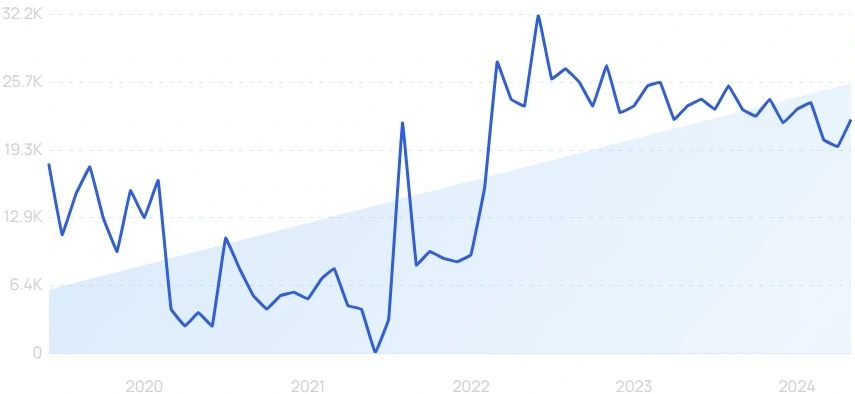
5-year search growth : 23%
Search growth status : Regular
Year founded : 2014
Location : Chennai, India
Funding : $3M (Series Unknown)
What they do : PickYourTrail is a platform for booking entire trips online (including flight, road transportation, and lodging). The startup reports that 46,000 people have used the service to date.
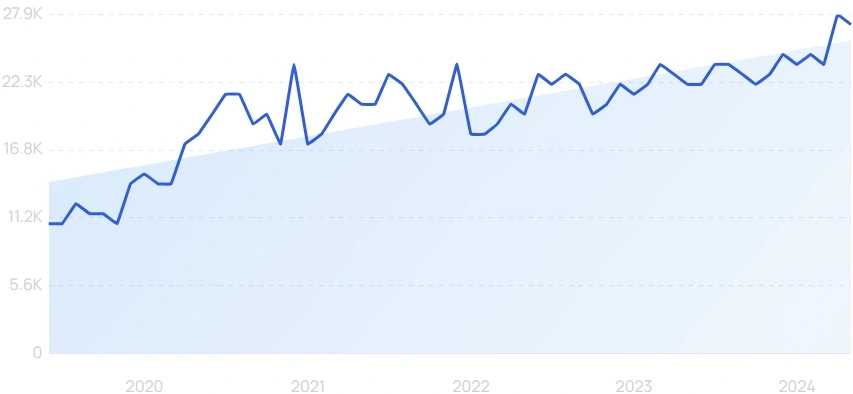
5-year search growth : 400%
Location : New York, NY
Funding : Undisclosed
What they do : Tracki is a travel tech startup that provides real-time GPS tracking solutions for individuals, families, and businesses. Their products range from portable GPS trackers to asset trackers and pet trackers, which can be easily monitored through their mobile app or web platform. The app has more than 500,000 downloads on the Google Play Store.
8. Very Local Trip
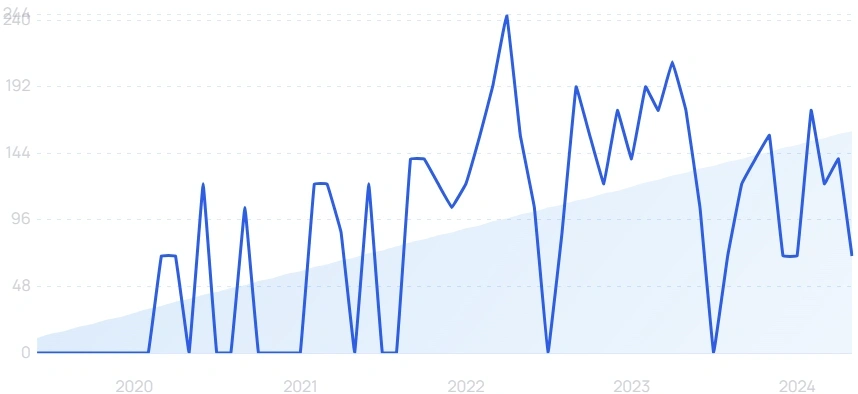
5-year search growth : 300%
What they do : Very Local Trip connects travelers with local tour guides. In other words, the startup is a focused version of Airbnb's "Experiences" feature. Currently, the startup offers experiences all over the world in Asia, Europe, North America, and the Middle East.
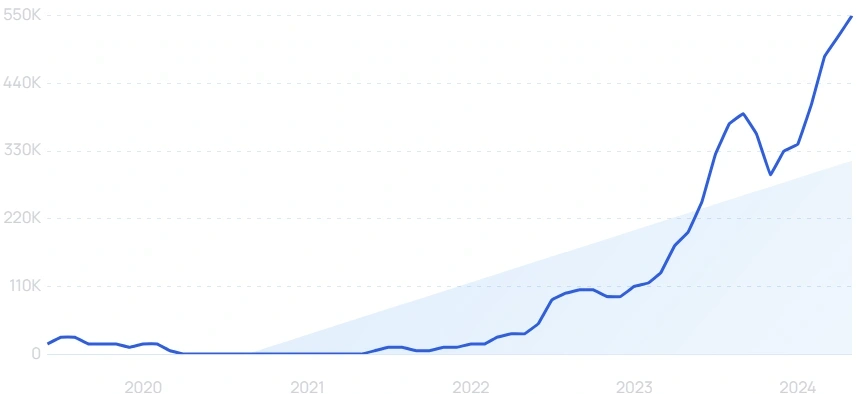
5-year search growth : 3,233%
Year founded : 2018
Location : Madrid, Spain
Funding : $200.6K (Seed)
What they do : Holafly is an eSIM startup that offers international data plans for travelers. The company partners with local providers in different countries and offers unlimited data plans for a fixed time period. Currently, the startup operates in 160+ countries with 1 million customers worldwide.
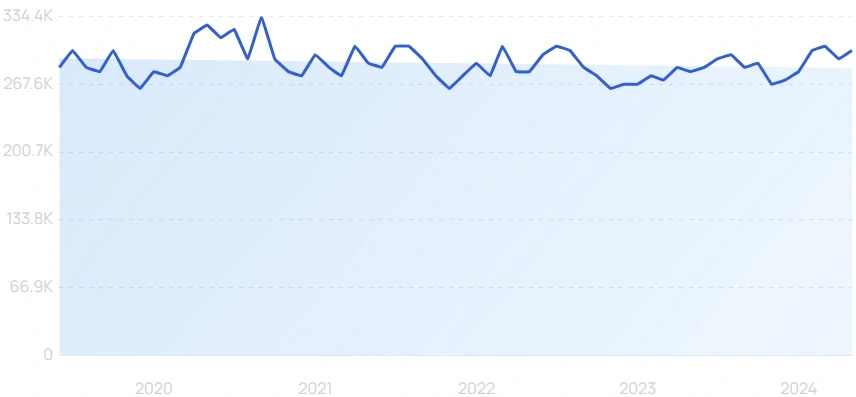
5-year search growth : 6%
Location : New York, New York
Funding : $181M (Series D)
What they do : Away is a DTC travel brand. Often called the “Warby Parker for suitcases,” the company keeps overhead costs low by selling direct-to-consumer. Away's product line includes travel luggage, sleep masks, travel pillows and blankets, and compression socks.
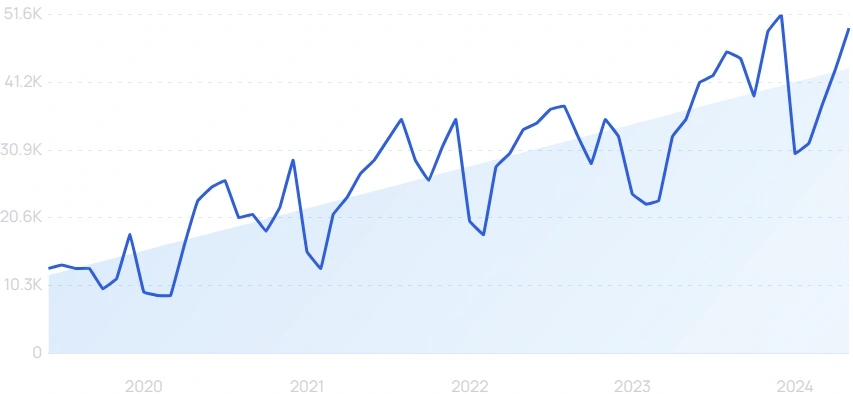
5-year search growth : 284%
Location : Denver, Colorado
What they do : GOTRAX is an electric scooter company that provides affordable and eco-friendly transportation solutions for urban dwellers. With a range of electric scooters for adults and kids, GOTRAX offers a convenient and cost-effective way to navigate through busy city streets.
12. Lodgify
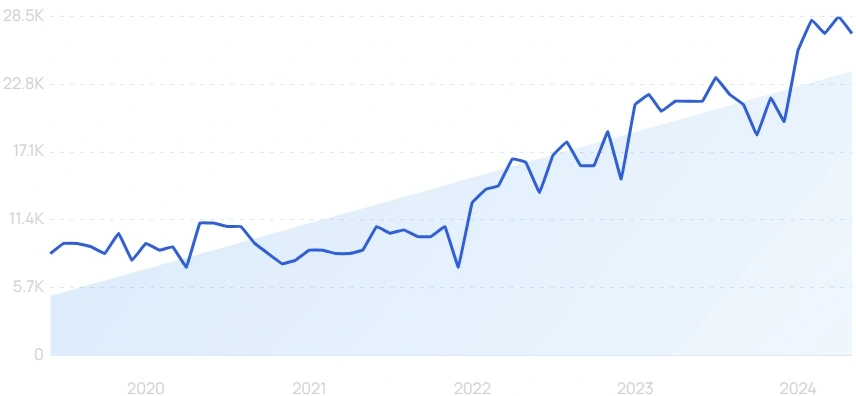
5-year search growth : 217%
Year founded : 2012
Funding : $36.6M (Series B)
What they do : Lodgify develops software that helps property owners manage their vacation rental properties. The all-in-one website includes features to manage bookings, accept reservations, and synchronize across different platforms, including Airbnb, Vrbo, and Expedia.
13. Bobobox
5-year search growth : 325%
Location : Badung, Indonesia
Funding : $13M (Non-Equity Assistance)
What they do : Bobobox is a technology-based hospitality startup that provides affordable and accessible capsule hotels for travelers in Indonesia. The company utilizes an app-based platform that allows customers to book and manage their stays, as well as access various hotel amenities and services.
Bobobox aims to revolutionize the hospitality industry in Indonesia by offering affordable and convenient lodging options that cater to the needs of modern travelers. The app has generated more than 1 million downloads on the Google Play Store.
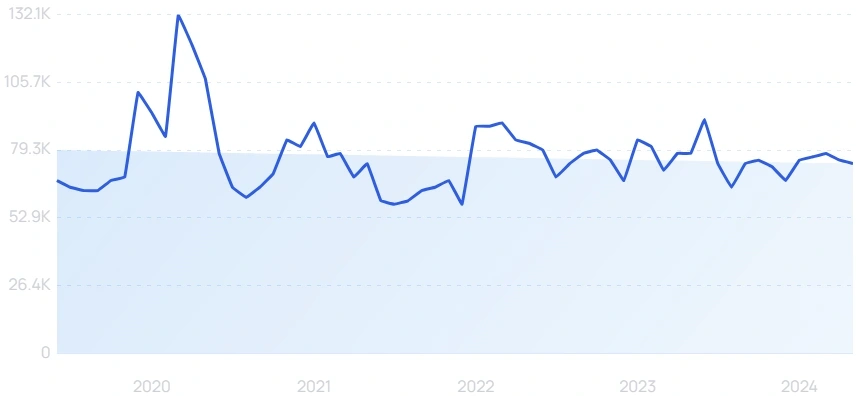
5-year search growth : 10%
Location : Bucharest, Romania
Funding : $1.8M (Seed)
What they do : Questo is a mobile app for iPhone and Android that gamifies city exploration. Users embark on "quests" to discover interesting spots and learn about local lore. Each quest is designed by a local "creator." The app currently offers quests in over 500 cities to more than 400,000 players.
15. Bespoke
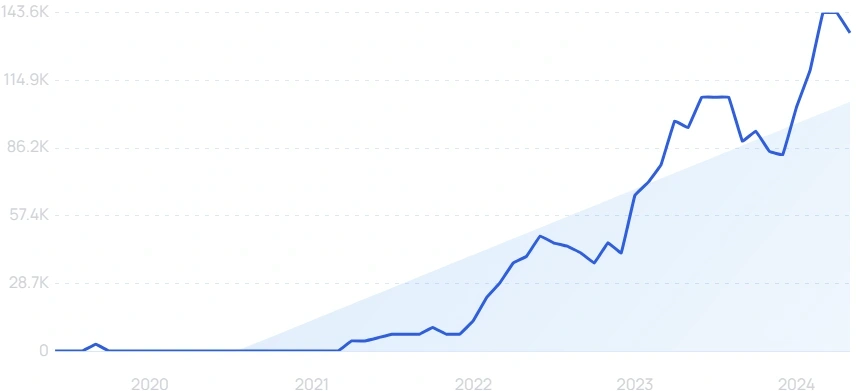
5-year search growth : 8,700%
Location : Tokyo, Japan
Funding : $2.5M (Series B)
What they do : Bespoke has developed an AI-powered chatbot designed for multilingual guest services. Their software provides hotel guests with answers to hotel-specific questions, local recommendations, and restaurant reservations. Bespoke was used by the Japanese government during COVID-19 to communicate critical health and safety updates to residents and travelers.
16. Tailos (Formerly Maidbot)
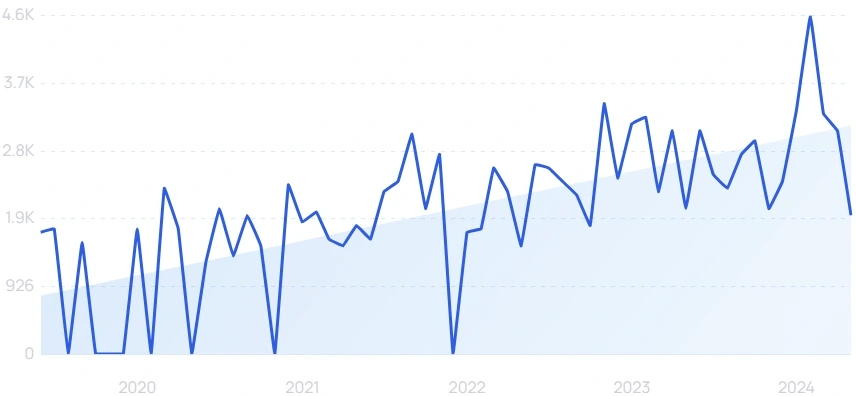
5-year search growth : 14%
Location : Austin, Texas
Funding : $50K (Series B)
What they do : Tailos , formerly Maidbot, manufacturers a housekeeping robot (named Rosie) designed to clean hotels and commercial buildings. Rosie takes on "dull, dirty, and dangerous tasks", in order to reduce injuries to staff while increasing productivity and consistency.
17. TasteAtlas
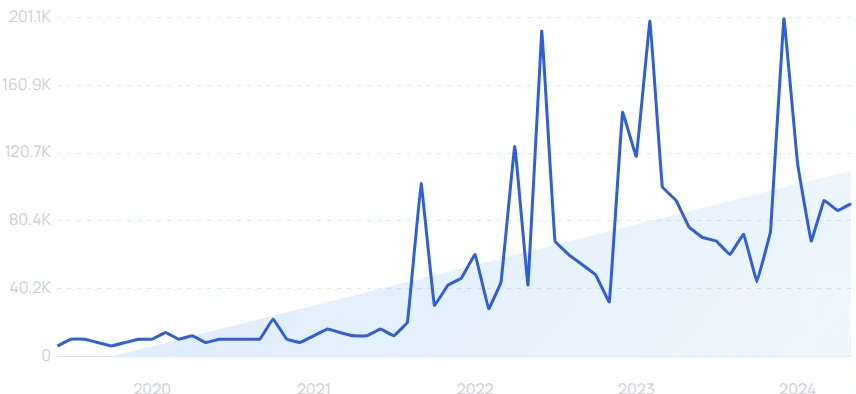
5-year search growth : 1,400%
Location : Zagreb, Croatia
What they do : TasteAtlas is a food and travel startup that provides a comprehensive guide to traditional dishes, drinks, and ingredients from all over the world. The platform offers a database of authentic food recommendations and local restaurants to help travelers discover new cuisines and experiences. Additionally, TasteAtlas allows users to create their own food maps and share their culinary discoveries with others.
18. Roame Travel
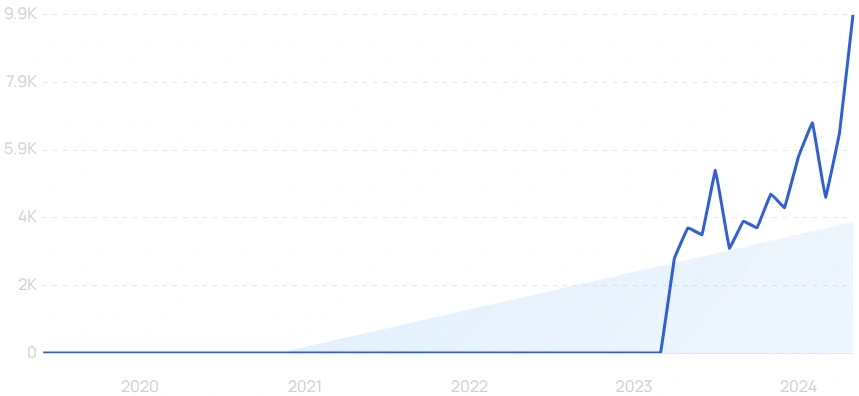
Search growth status : Exploding
Year founded : 2023
Location : San Francisco, California
Funding : $500K (Pre-Seed)
What they do : Roame is a free award travel search engine that finds available flights that qualify for credit card points and miles redemption. Currently, Roame provides search results for 16 airline loyalty programs and 200 airlines . Users can upgrade to a premium membership to access the SkyView feature, a search function that finds flights within a 90-day search window.
That wraps up our list of travel startups growing despite the hardships of the pandemic.
The trend away from traditional hotels and towards short-term rental properties, RVs, and campsites accelerated this year as more people work remotely and seek a change of scenery.
There is also a notable shift towards AI and automation, as hotels seek to cut costs and increase efficiency.
Find Thousands of Fast-Growing Startups With Our Platform


- The Pakt Travel Backpack
- Pakt One Travel Duffel
- 25L Travel Duffel
- All Travel Bags
- Everyday 3L Sling
- Everyday 5L Sling
- Everyday 15L Bag
- Everyday 22L Backpack
- Everyday Tote
- All Everyday Gear
- 6-piece Packing Cube Set
- Clip-in Pouches
- Mojito Wallet
- 16oz Leakproof Travel Mug
- Sling Sport Strap
- All Accessories
- The Anywhere 5L Sling
- The Pakt One v1
- rePakt Pre-traveled Gear
- Sustainability
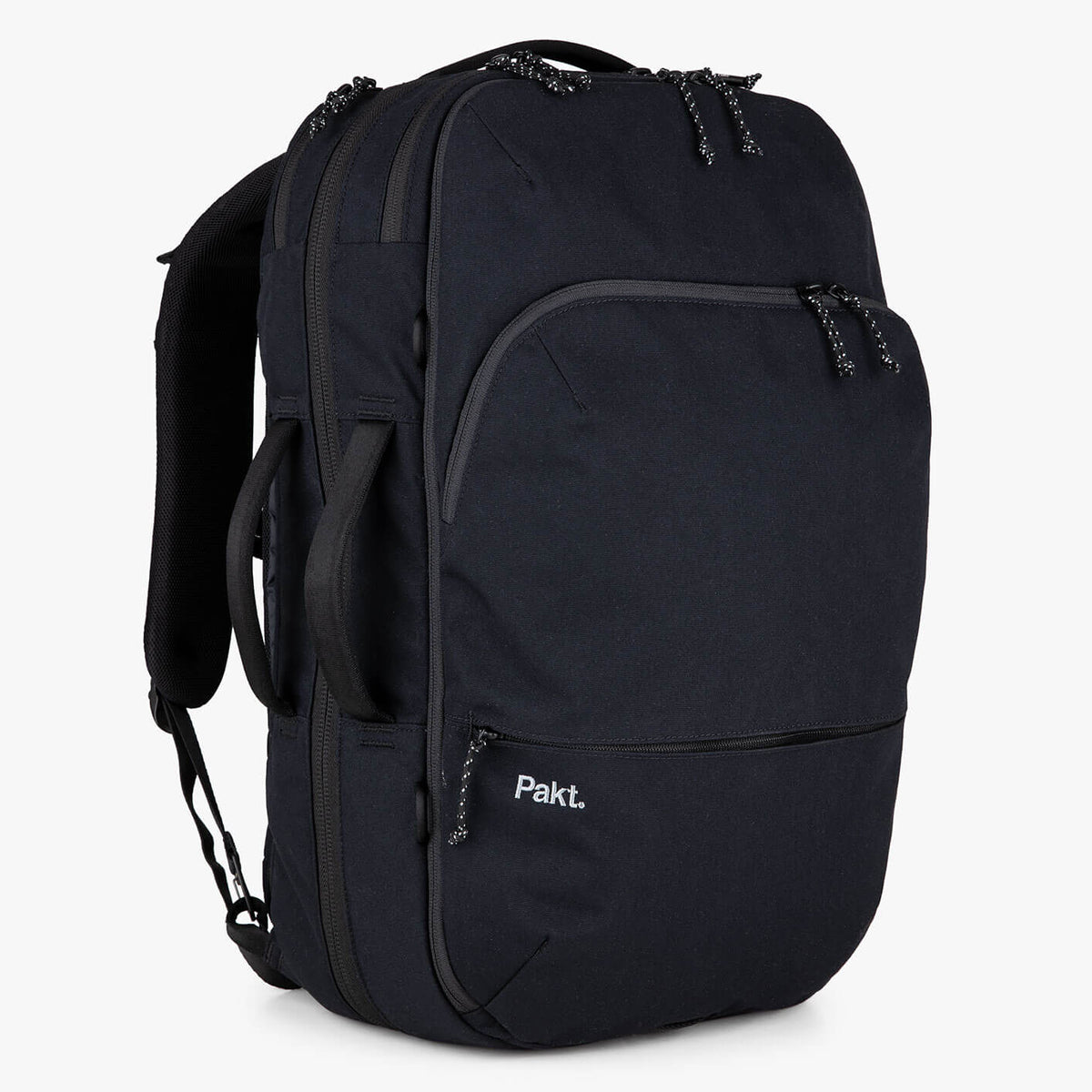
Your cart is empty
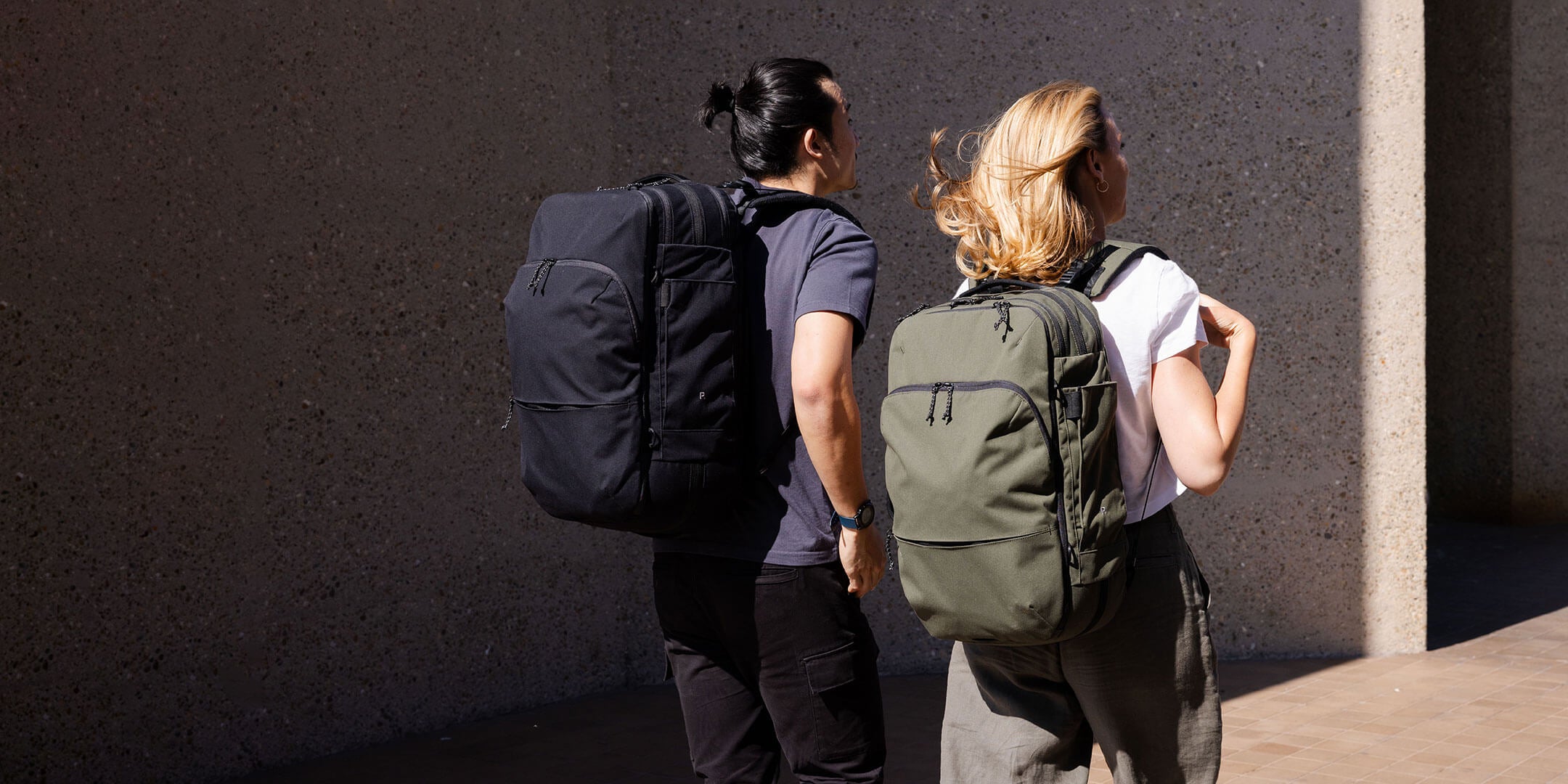
Travel like a pro, live like a local. Travel like a pro, live like a local.
Performance travel gear designed with the planet & people in mind
Travel backpacks and duffels
Versatile travel gear for any trip.
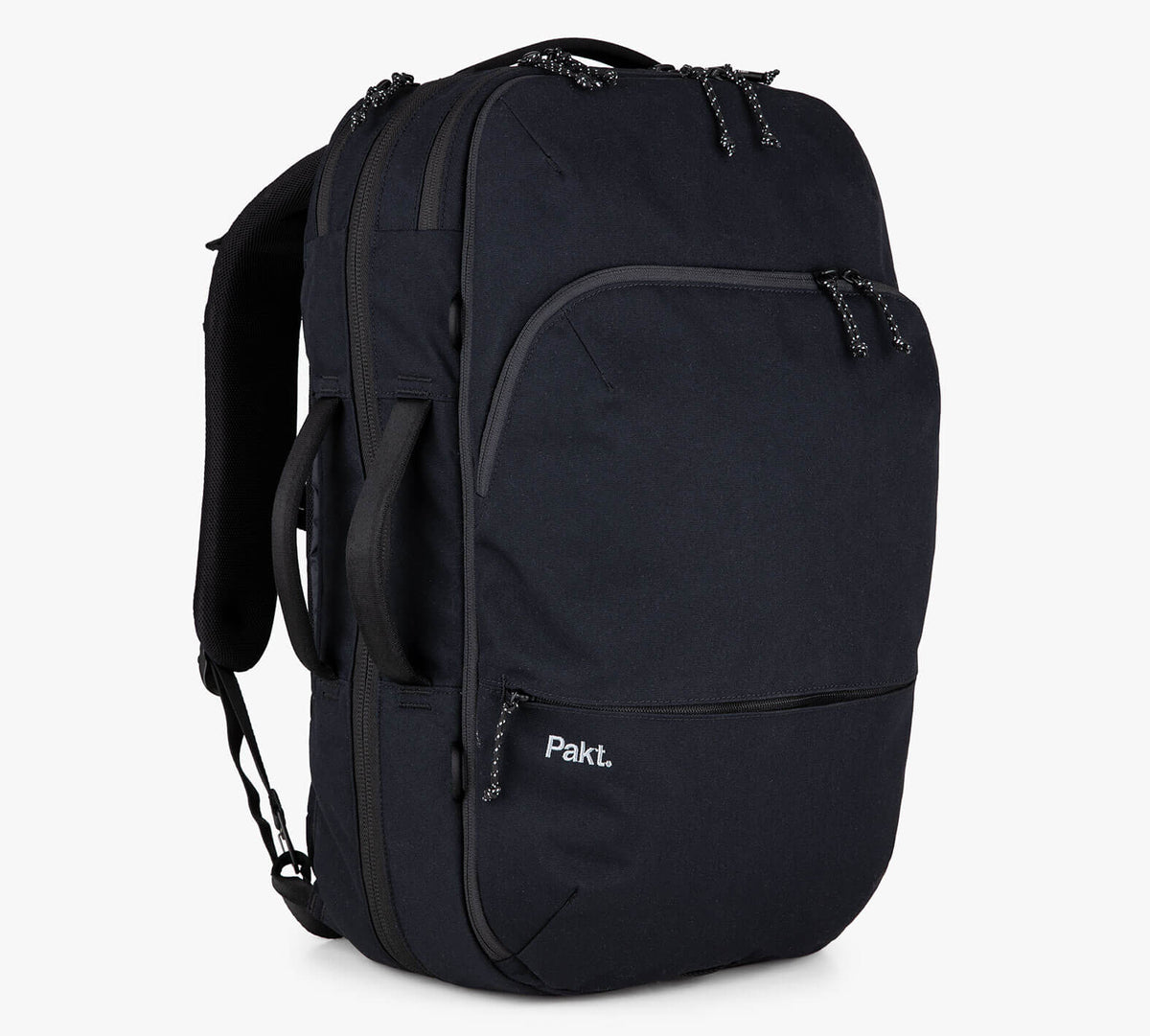
The Everyday Carry Collection is here
When you travel, why switch bags? You’ll want your favorite daily sidekick with you anywhere you go, so we designed the new EDC gear to also be the perfect personal item or day bag when you’re far from home.
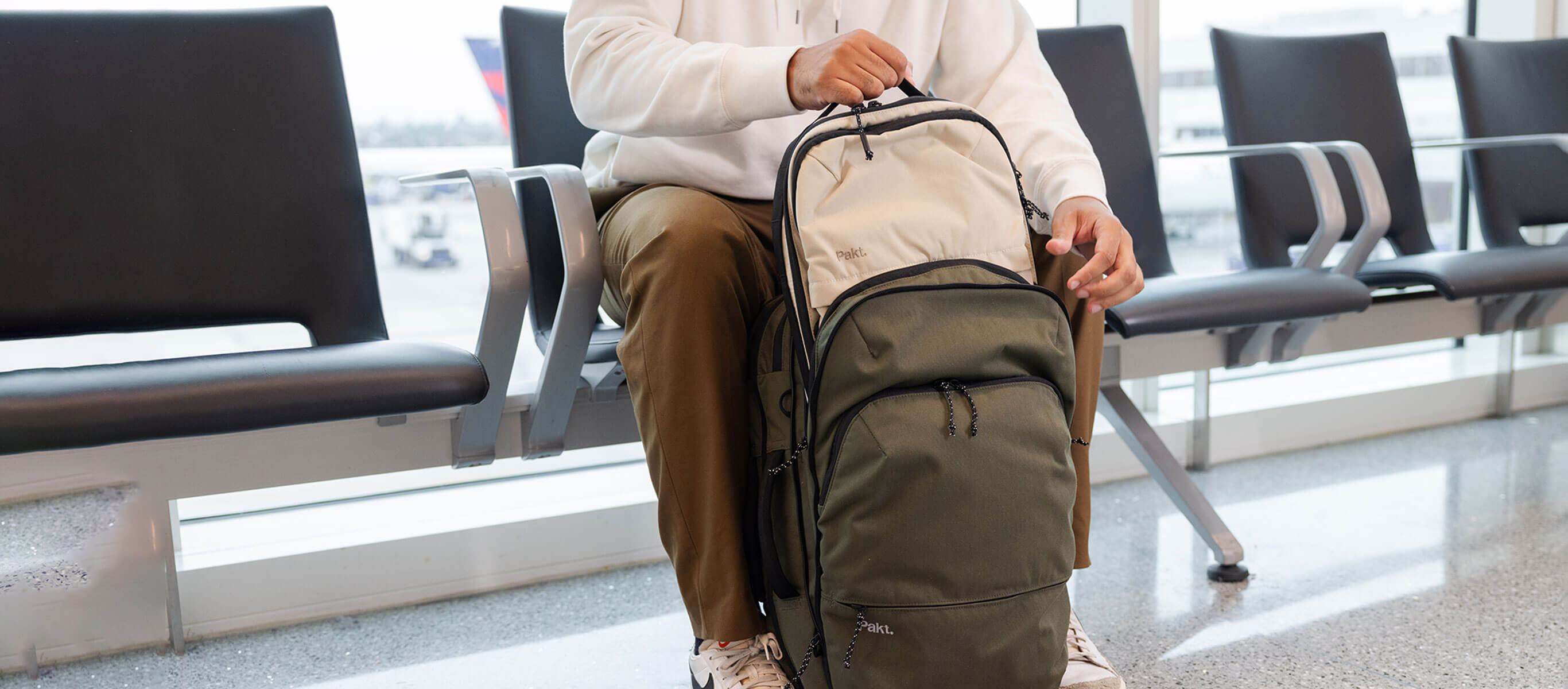
Meet the ultimate carry-on system for smoother travel
The best-selling Travel Backpack is back with a brand new set of features, plus updated materials and hardware. Selecting your ideal size, then build your perfect system with accessories that match your travel style.
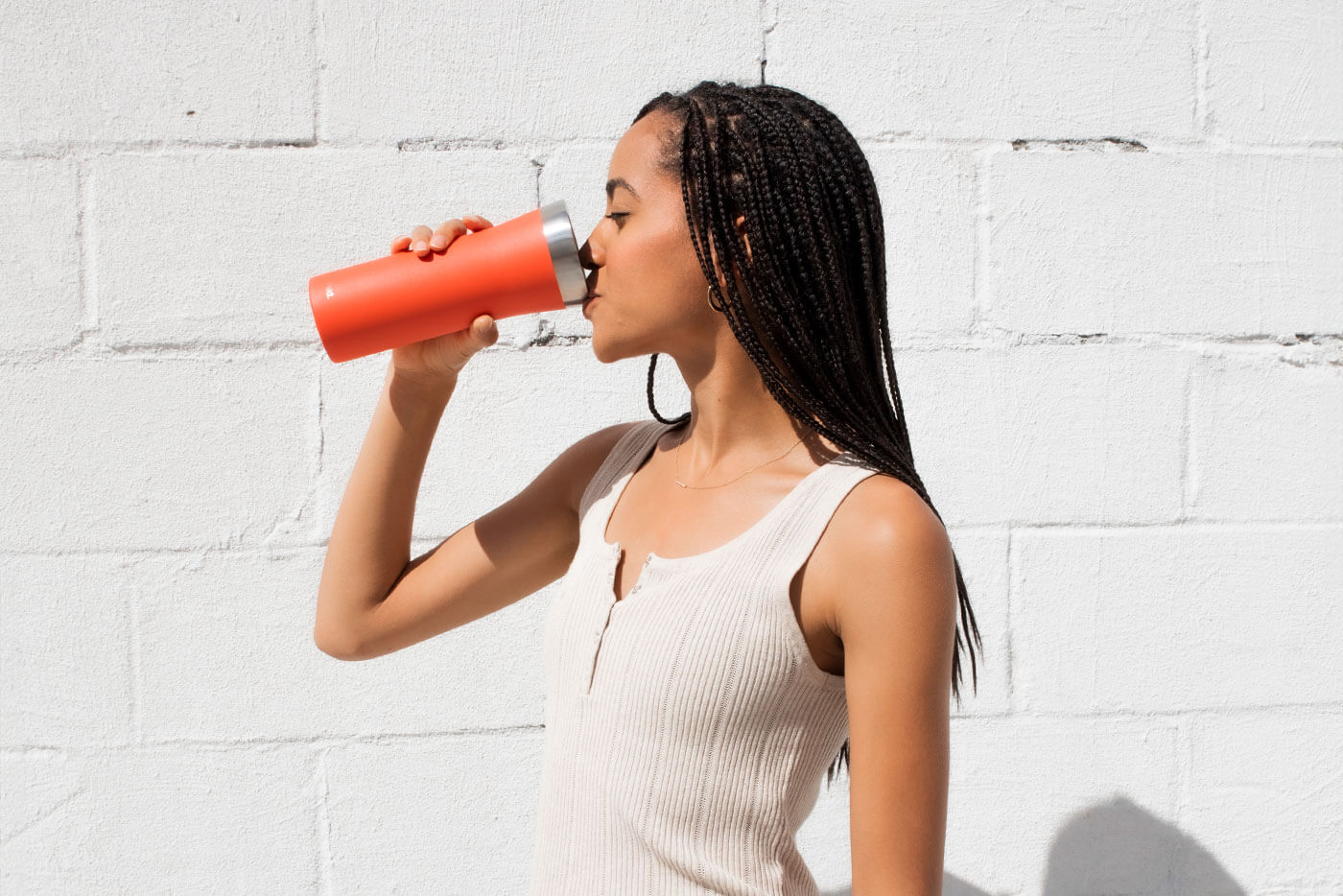
The journey, perfected.
Custom organization options and travel accessories that complement any Pakt system create the ultimate travel ecosystem for a smooth travel day.

Join the Pakt Community Group
We created the new Pakt Community group on Facebook to have a central meeting place for the gear and design obsessed travelers of Pakt. Share destination tips, pics, and get recommendations on the best adventure-worthy products from within our community of seasoned travel-vets.
Get custom embroidered bags and engraved accessories
Whether it’s a classy party favor or corporate branded swag, give sophisticated customized gear that will last a lifetime of adventures.
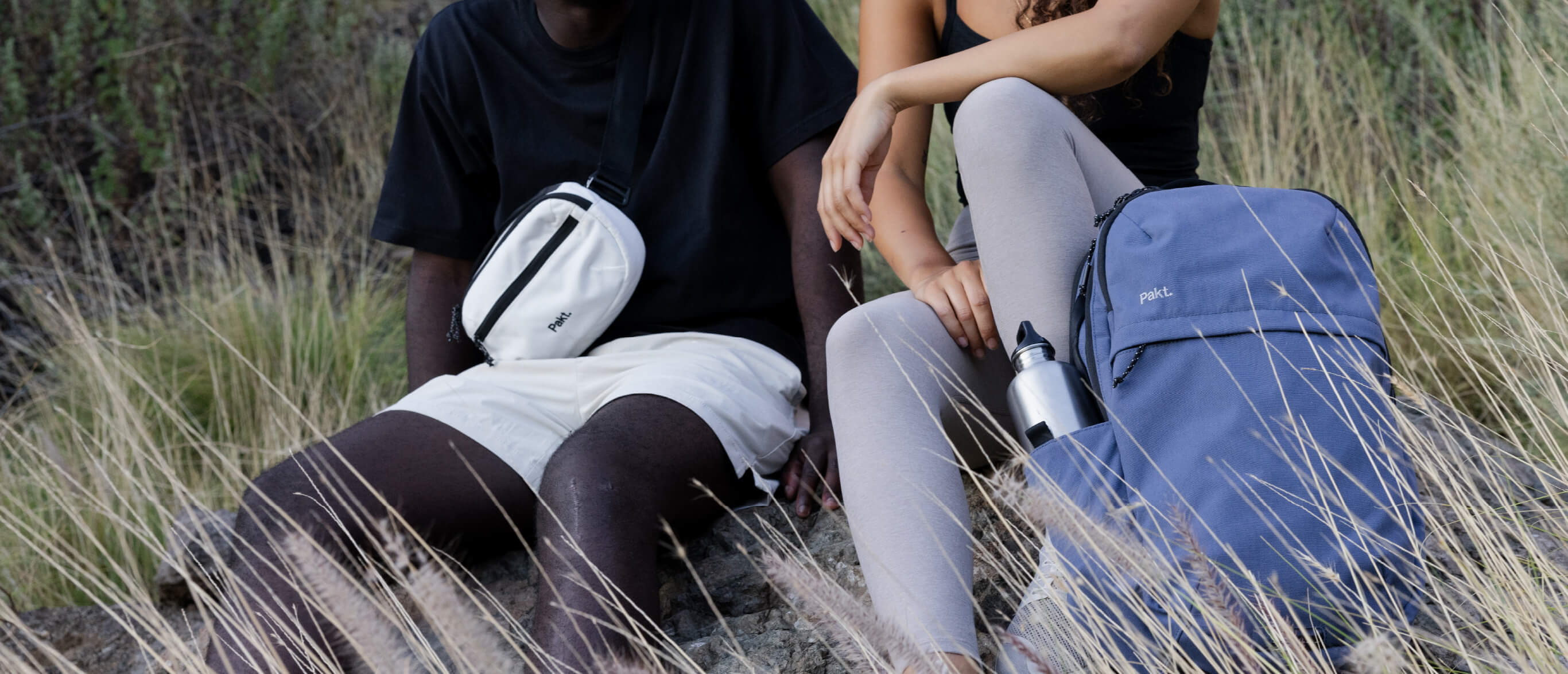
Committed to performance and the planet
We are constantly tweaking our processes to become as environmentally and socially responsible as possible, and now, you can follow along on our journey on our new Transparency Report.
Starting A Travel Backpack Business And Growing To $20K/Month

Hello! Who are you and what business did you start?
Hi guys! Thanks for stopping by. I’m Chez, the founder of Gobi Gear . I started Gobi Gear about 4 years ago to make organization easier and more fun, specifically focusing on the outdoor adventure and travel markets. Rummage less, explore more!
Our gear bags are designed to make staying organized easy, no matter where the adventure takes you. We take pride in selling high quality gear - expecting our items to last. We are a 1% For the Planet partner, and we use no plastic in our packaging - having saved over 70,000 plastic bags (and counting)!
Our first product was known as the Hoboroll - a super cool bag that works as a stuff sack or a day bag, with 5 inner organizational compartments and a secret stash pocket. Made of ultralight, water-resistant nylon, this bag fits in the palm of your hand but is ready for adventure at the drop of a hat.
Even though we design our gear for the outdoor adventurer, our fans also use our bags in everyday use, from the gym to their kids soccer games. Thus we are launching a brand new line of every-day bags! Ready to serve anyone with an active lifestyle, from mom’s needing diaper bag organization to gym-goers and kite-boarders alike!
The best measure of success for isn’t just the bottom line, but rather walking through an airport and seeing a stranger with a Gobi Gear backpack on. Or learning that the owner of other, big brand name outdoor gear companies have heard of you. The idea of outfitting all kinds of people with our gear, all across the world, and putting smiles on their faces - that is what success is to us!

What's your backstory and how did you come up with the idea?
I started Gobi Gear just before my big trip through Asia. My husband and I had a 3 month trip planned - also known as “travel until the money runs out”, and we were starting out with a 100-mile trek in the Nepali Himalaya. We had already decided we wouldn’t use porters and instead carry our own gear.
The best measure of success for isn’t just the bottom line, but rather walking through an airport and seeing a stranger with a Gobi Gear backpack on.
I had also committed to collecting botanical specimens, as part of my volunteering for the local University in Kathmandu. Never collected plants before? It’s waaaay slow. Ever the impatient hiker, I had to come up with an idea to still be able to cover a lot of ground even while collecting. I realized that the slowest part of the day would be packing/unpacking every morning/evening, and looked for a solution to make this go faster.
When I was not satisfied with the solutions out there (stuff sacks mean scattered gear, plastic bags rip and = trash later) I decided to just make my own. I thought a stuff sack with inner dividers would be great - all my gear in ONE place, yet still separated. I got after it on my sewing machine, using leftover curtain fabric, and made the world’s heaviest stuff sack. But it worked!
Thanks to my nifty divided stuff sack, I was always ready to go, knowing where my gear was. Packing was a non-event. I was ready to go each day before everyone else! Lots of time for flowers.
I showed the bag to other trekkers, who immediately wanted their own. Shortly after our trip I decided to put the idea to work, and created a version that could sell to other folks who also wanted to stay organized while on-the-go.
Soon Gobi Gear was born, and I embarked into a crazy world that I had never know - branding, marketing, web design, graphic design - whoa! I have a dual degree in Biology and Economics, and thus knew nothing of how to grow a company. My full-time job at the time was botanical work (and still is). Gobi Gear has been an incredible journey of learning and being pushed outside comfort zones.
https://www.starterstory.com/subscribe
Describe the process of designing, prototyping, and manufacturing the product.
Turns out… manufacturing is one of the hardest parts of running a business. Not only does inventory mean you are cash poor (or vice versa), but any delays or issues with manufacturing can drastically hurt your bottom line.
Gobi Gear started slowly, very slowly, as I was limited to a small initial investment ($20K), meaning a small quantity order to begin (3000 units). In retrospect this was good for us - it allowed us to not overextend early, and maneuvering to meet customer wishes was easy.
We found our first China factory on Alibaba, through months of research and prototype samples. We have also worked with agents, local to China and the USA, and in the end, decided it best to just work directly with the factories.
Manufacturing is one of the hardest parts of running a business. Not only does inventory mean you are cash poor (or vice versa), but any delays or issues with manufacturing can drastically hurt your bottom line.
Manufacturing is a complex thing, especially for our ultralight product line - we have to specify everything down to the type of thread, and lead-times on fabrics can be up to 9 months. This complexity, however, is why we found it best to ditch the agent - things got lost in translation, and the questions were still just as numerous, only filtered through the agent and thus adding to the complications.
A manufacturing disaster
In fact, we had an agent out of Boston that turned from great into total disaster, from one thing to the next. They were late on a very important order of 25,000 bags - meaning they had to air freight the goods instead of ocean freight them.
Then they messed up our packaging for 5000 units: a hole had to be cut into a cardboard tube to allow for a hang-tag, and the samples we received had burn marks and ash stains.
I brought this up as a concern and the agent assured me it was only for sampling; the final product would not use that technique. But of course, when we finally received the goods, what do we have? Burn and ash... And not just the packaging, but it damaged the bags inside, rendering them unsellable. It was a huge waste of time and money.
Later we then found that all of the products in one color scheme had the cord-lock and drawstring mis-threaded, so we had to pay USA labor costs to get those fixed, too. To be fair, the agent did pay for a lot of these issues, but wasted no time in pointing out “errors on both parties”, implying a lot of this was our fault. All we did was place an order…
Playing the waiting game
When Gobi Gear gets ready to place an order, we now work directly with the factory, and hold the production spot 6 months in advance with a down payment, even if we aren’t sure exactly what we are making! Then we start sourcing as many of the product parts as possible, such as gray drawcord and cord lock, leaving the other details for later.
Word of advice: The factories are just about always late on big orders - if they quote you August, you count on September. Just the way it is. Never have a promise date of early March if you’re EXW-China - their Chinese New Year is not only several weeks long, but there can also be a lot of employee turnover, meaning upon vacation return, there aren’t enough workers to finish the job in time.
Once production is done, and 166 emails have changed hands, the goods get shipped! And then the real fun begins.
Describe the process of launching the business.
Just launch it! So many people want it to be perfect the first time - and it probably won’t be. Once on the market, your customers will have ideas or thoughts that you’ll want to add to the next production round - so just get started! That is for us what helped - we dove it!
Launching Gobi Gear was a moment of excitement and trepidation - as well as one full of opportunity to learn. We built our first site on Dreamweaver, long before Shopify. And here is the thing - it could always “be better”, but honestly, it’s probably good enough! I fussed and tinkered so many times I finally broke the site, and had to just go back to basics. * New rule: if it is too hard, we don’t do it. *
The first orders that come in are so exciting! Even if it is friends and family… and then the one dude whose name you don’t know. Who is this hero??!
Over time we re-launched our website on Shopify, but eventually left that for WooCommerce and WordPress, as they allow much more flexibility in design (and hey, gotta put all of my coding skills to work now, right?). Might go back to Shopify. TBD :-)
We also love Amazon - first we sold as “seller fulfilled”, but I still recall the day we got approved for Prime. What a difference! Now we ship boxes of 100s of units to Amazon and they do the rest (okay, not that easy, as they make errors too, but it is still awesome). Amazon is a huge marketplace, and who doesn’t live Prime?
To get started, I financed the business with my savings. As the business grew, we sold our inventory (recovered our cash), but then needed more inventory, and thus more cash. The best platform was Kickstarter! We launched in July of 2014, and raised over $80,000! This was great cash as it allowed the funding of a new inventory order, as well as other things such as a new patent, a website redesign, and paid for a good PR team for a year.
From the beginning, Gobi Gear has always been very good at paying its own bills from its sales; but pushing growth forward is where the extra cash comes in - always finding that next customer.
So we learned three important things about launching and money spent:
1 - Do it as cheaply as possible.
It is so easy to spend it big to get started, but you don’t need to! Word-of-mouth, referral campaigns, and 5-star reviews are great ways to get new customers. Good customer service keeps the previous ones coming back for more.
2 - Have multiple products or colors.
As long as they are curated and not just any old thing. It really helps sales, as customers like choices.
3 - Get your brand out there from the start!
We did not know this, and didn’t have a logo that was prominent or even have our website on our packaging! How do you find us? We now have a backpack with our logo on the outside - this is huge.
Since launch, what has worked to attract and retain customers?
Google, Facebook Ads
Marketing used to be far outside my comfort zone, but I am getting a lot better at it. And we really have tried it all - Google Ads, Facebook, YouTube, paid PR and social media teams to do it for you.
In general, I have not seen a good ROI on most paid advertising. It could be that my ad graphics and messaging are not spot-on, so they don’t convert as well, or that our products are not super photogenic.
It could also be that our average product sale is $20 - not a lot of meat on that bone. Our ad spend hit $16k/mo at one point, and barely moved the needle. Bummer. At least we tried!
We have had success with Amazon ads, as well as with retargeting ads on Google. We spend about $200-600/mo now, and get and ROI of 1.5-6x, depending on the season. Advertising on Amazon is so much easier than Facebook or Google.
You don’t add graphics or copy. You can only bid on keywords, and they do the rest. Either it works, or it doesn’t. I actually love the simplicity. I find better than changing keywords is changing the time of year that you run the ads - some months, like September, are just quiet, so we don’t bother running ads anymore.
Amazon Sales
Amazon itself is a fascinating sales channel - they do a lot of the work for you, and you get in front of a huge marketplace.
But there are knock-offs, and Amazon has mixed up our inventory more than once, then shut down our account because customers were receiving products “not as described” - well, yea, because they mixed them up!
Detangling these issues can cause a lot of headaches. Overall? Worth it.
But our biggest success for attracting new customers has been bloggers and editorial reviews of our product - we’ve had some as big as the Chicago Tribune , Men’s Journal (print edition), and Cheap Flights work with us! That brings the product to new eyes.
Another huge marketing tactic that turned a corner for us was pop-ups on the website. By not having a pop-up, visitors who aren’t ready to purchase are lost forever.
This may seem “duh” now, but years ago it wasn’t so. Sumome made it very easy to get your own pop-ups that integrate directly with automatic email campaigns.
There are other things that I feel are necessary but harder to quantify: SEO is something you always need, and could spend thousands if you aren’t careful - or you can download Yoast (Wordpress sites) and do it yourself. Better than nothing yea? After obtaining numerous quotes on SEO, and deciding it was unaffordable, I went with Yoast and took it upon myself to learn all about it.
Moving forward, I think Google, with its overly complex platforms and too many ways to track tiny variations of the same thing, will be losing ground to Amazon and Facebook - which are much easier to advertise on. So, I did the SEO myself, and didn’t worry about the rest. I am focusing my energy instead on easier platforms. If it’s too hard, I don’t pull my hair out trying to make it work - I just move on.
Viral Contest
When launching a new product we have found that viral campaigns or giveaways really help get a solid email list. Before our last Kickstarter we gained 2500 new email addresses through a viral campaign & landing page we made through KickoffLabs. We sent out an initial eblast to 5000 people, and got 2500 new email addresses - so a 50% increase!
Once grown, our email list has been the best for sales. We cherish it, nurture it, offer special discounts and sales, and encourage social sharing and referrals to friends.
Customer Service
Taking good care of customers is important to us and helps our sales - many times I personally reply to customers, and not just about their particular issue, but I ask for pictures of their last vacation or find out what adventure they’re looking forward to. Gobi Gear is a company, but it is also an extension of me, and I am just another adventurer like you :-)

How are you doing today and what does the future look like?
Our gross margins are 58%, on average. This is after cost of goods, shipping and fulfillment costs, and include a blend of B2C and B2B sales.
Most of our business is B2C (direct to customers), through our website and Amazon. While we do have retailers and work with subscription boxes from time to time, we enjoy the higher margins of direct sales.
One variable for us is ad-spend, which as mentioned before is usually relatively low, but can increase during holidays or during a Kickstarter event.
We have a new website visitor rate of about 85%, and they usually browse for over 90 seconds, with a bounce rate just under 50%. Monthly traffic averages 2500 users.
Once we get new customers to our website, we do the following:
1. Obtaining their email
We use SumoMe to offer various discounts or sales in the form of a pop-up. We have an average of 4% opt-in during most of the year, and 15% during Black Friday and Christmas sale events. Even if the customer doesn’t convert right away, we can follow up later with emails, offering incentives.
As the customer adds goods to their shopping cart, we have little messages that appear letting them know they “only need to add $15 more to get free shipping”. This helps us sell more goods in each order, keeping fulfilment costs down.
3. Follow-through
After the customer makes a purchase, we send them follow-up emails to ensure they are happy with what they received and suggest uses for the product they just purchased. We feel this helps them make a more meaningful connection to the company they just made a purchase from.
Email marketing is huge
I mentioned it already, but our email list is our biggest converter! We use ActiveCampaign to enter customers and potential customers into email funnels, sending them various messages based on their behaviour - we can get more targeted this way, instead of sending out a generic message to everyone over and over.
Our daily routine involves checking new orders and getting them shipped out, replying to customer service messages (if any), some social media posting, outreach to a few key retailers/checking in on current ones, PR outreach, and planning for the release of our new product line in 2019. Perhaps a little accounting if I need a nap (just kidding).
New Product Line
Gobi Gear will be entering the lifestyles marketplace - taking the high-quality, durable gear to the everyday consumer, with a new line of affordable, multi-purpose organizational day bags and tote bags.
Through starting the business, have you learned anything particularly helpful or advantageous?
You know your brand better than anyone
In the beginning, it is easy to outsource, thinking that other people will be better than you are at various tasks. But in the early stages it behooved me to do those things myself. Outsourcing costs money, which is tight for a start-up. And they’ll never be quite as good at selling your brand as you are. I know because I tried it both ways. Others might seem more professional or have all the “tricks”, but everything more genuine when it comes from you - and early on, that is what customers want, to connect with you and your brand.
It also helps you really dive in and understand what your value proposition is and what you are providing to people. And it allows you to be a better manager later, having some understanding of the task you have just assigned.
Resisting outsider money
To this day, I am still resisting the offers of investor money, and instead keeping it all in-house and in family. That is really hard on the bank account sometimes, and we are strapped for cash more oft than not, but, you learn to get scrappy, get clever, and get by. No one owns us - I have no one to answer to, and that freedom is worth a lot!
This might not be the best path for everyone; we are a small family business and I am happy to keep it that way. Aggressive growth would be very hard without extra inputs from investors.
Manufacturing is always going to be a headache
It seems that no matter how on top of it we are, things always come up. Whether it is hiring the wrong agent, or having the factory deliver an entire month late (and missing your subscription box deadline and losing the entire sale - eek!), these things are out of your control sometimes and the best you can do is damage control. And that in itself can be very important. How you respond to issues can make or break your business.
We have learned over the years to 1) work with the factory directly for as long as possible; 2) add in 2 months cushion; and 3) have a contingency plan!
Don’t try to do everything perfectly
When I first got started, I would get paralyzed sending out a MailChimp eblast to my 146 subscribers, because I didn’t love the font, or the border color, or maybe “this image could be brighter”. In the end, what mattered was that I sent the email in the first place.
Fretting over the details - from emails to product features - wastes time. Just get it out there. Don’t overextend yourself on your first product production. Just go for it! Your customers will tell you what they think. Then you can make necessary changes.
Helpful Skills
I taught myself web coding and design, graphic design, marketing, branding, and how to automate as many processes as I could. These skills have greatly helped me because I do not need to outsource, and now that I’ve given up on perfection, I am very happy with where the company stands today and the lack of cash burn.
What platform/tools do you use for your business?
We have tried both Shopify and WooCommerce. I prefer Woo as it is more flexible and you host your own domain, which is better for SEO.
When you are on Shopify, your site is actually “website.my-shopify.com” - meaning Shopify gets a lot of your SEO. That being said, Shopify is way easier to use as everything is all part of the package deal.
With Woo, you need to download plugins and connect the dots. We are considering a homepage in Wordpress and a checkout cart in Shopify.
- Sales Platform: WooCommerce
- 3rd party apps: Abandoned cart; X-theme as it is the most flexible and responsive!
- Email Marketing: ActiveCampaign
- Email Capture: SumoMe
- Affiliate Program: AvantLink
- Internal Organization: Basecamp
- Fulfillment: CliqueHere & In-House
- Customer Service: ZenDesk
What have been the most influential books, podcasts, or other resources?
I really like books that pull out my creative flow. There are of course books that were great for me as it directly relates to business, Poorly Made in China is one, but in general I find it more valuable to get lost into books about the botanical explorations of the Amazon, or journies by motorbike through the Congo. These type of books allow me to relax and step outside of my world, and then later I find it easier to focus on the creative flow of Gobi Gear.
I also dive deeply into daily meditation, yoga, and exercise. These activities help me clear my mind and give me the ability to tackle issues that may arise, as well as have the right perspective going forward.
Advice for other entrepreneurs who want to get started or are just starting out?
Just go for it! The products you see today are not the first iteration - but you have to start somewhere.
Listen to others, but in the end, remember to hear your own voice. You will know deep down what is best for your company. At least for me, it seemed that everyone had an opinion. Some were right, some not. And be wary of those just trying to sell you their services. Their advice may be skewed (naturally).
Don’t worry about the mistakes - and use it as a chance to bond with customers. Some of our biggest fans today were our angriest customers - good service and old fashioned caring turned them around.
Are you looking to hire for certain positions right now?
We are not looking to hire, but anyone who is interested in marketing/branding and has clever ideas for us - we’d hear you out, and possibly work out a gear-for-work exchange.
Where can we go to learn more?
We just launched our new product, the Happy Hour - backpacks with a drink cooler ! Check it out!
- Website: GobiGear.com
- Facebook: GobiGear
- Instagram: @GobiGear
- YouTube: Gobi Gear

- 4,818 founder case studies
- Access to our founder directory
- Live events, courses and recordings
- 8,628 business ideas
- $1M in software savings
Want to start a backpack line? Learn more ➜
Join our free newsletter to get unlimited access to all startup data. We just need your email:
Check your email
If there's a Starter Story account associated with that email you'll get an email with a link to automatically log in. The link will expire in 15 minutes.
Your existing password still works, should you want to log in with it later.
With Starter Story, you can see exactly how online businesses get to millions in revenue.
Dive into our database of 4,418 case studies & join our community of thousands of successful founders.
Join our free newsletter to get access now. We just need your email:
- Discovery Platform
- Innovation Scouting
- Startup Scouting
- Technology Scouting
- Tech Supplier Scouting
- Venture Clienting
- Startup Program
- Trend Intelligence
- Business Intelligence
- All Industries
- Industry 4.0
- Manufacturing
- Case Studies
- Research & Development
- Corporate Strategy
- Corporate Innovation
- Open Innovation
- New Business Development
- Product Development
- Agriculture
- Construction
- Sustainability
- All Startups
- Circularity
- All Innovation
- Business Trends
- Emerging Tech
- Innovation Intelligence
- New Companies
- Scouting Trends
- Startup Programs
- Supplier Scouting
- Tech Scouting
- Top AI Tools
- Trend Tracking
- All Reports [PDF]
- Circular Economy
- Engineering
- Oil & Gas
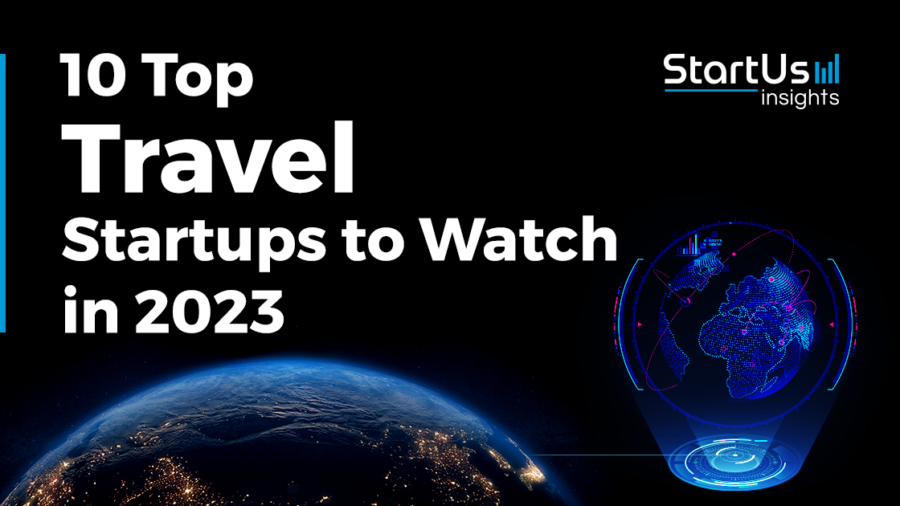
Share this:
- Click to share on Facebook (Opens in new window)
- Click to share on Twitter (Opens in new window)
- Click to share on LinkedIn (Opens in new window)
10 Top Travel Startups to Watch in 2023
Are you looking for the latest advances in the travel sector? Explore the innovative solutions from the 10 hand-picked startups that we feature in this Travel Startups to Watch in 2023 article. They work on AI travel assistants, low-carbon travel, VR-based tourism, luggage protection, and much more!
Global Startup Heat Map highlights 10 Travel Startups to Watch in 2023
Through the Big Data & Artificial Intelligence (AI)-powered StartUs Insights Discovery Platform , covering over 3 790 000+ startups & scaleups globally, we identified 3 845 Travel startups. The Global Startup Heat Map below highlights the 10 travel startups you should watch in 2023 as well as the geo-distribution of all 3 845 startups & scaleups we analyzed for this research. Based on the heat map, we see high startup activity in the US and India, followed by Europe. These 10 hand-picked startups work on solutions ranging from AI-powered travel assistants and carbon-compensated travel to luggage locker networks and location-sharing apps.
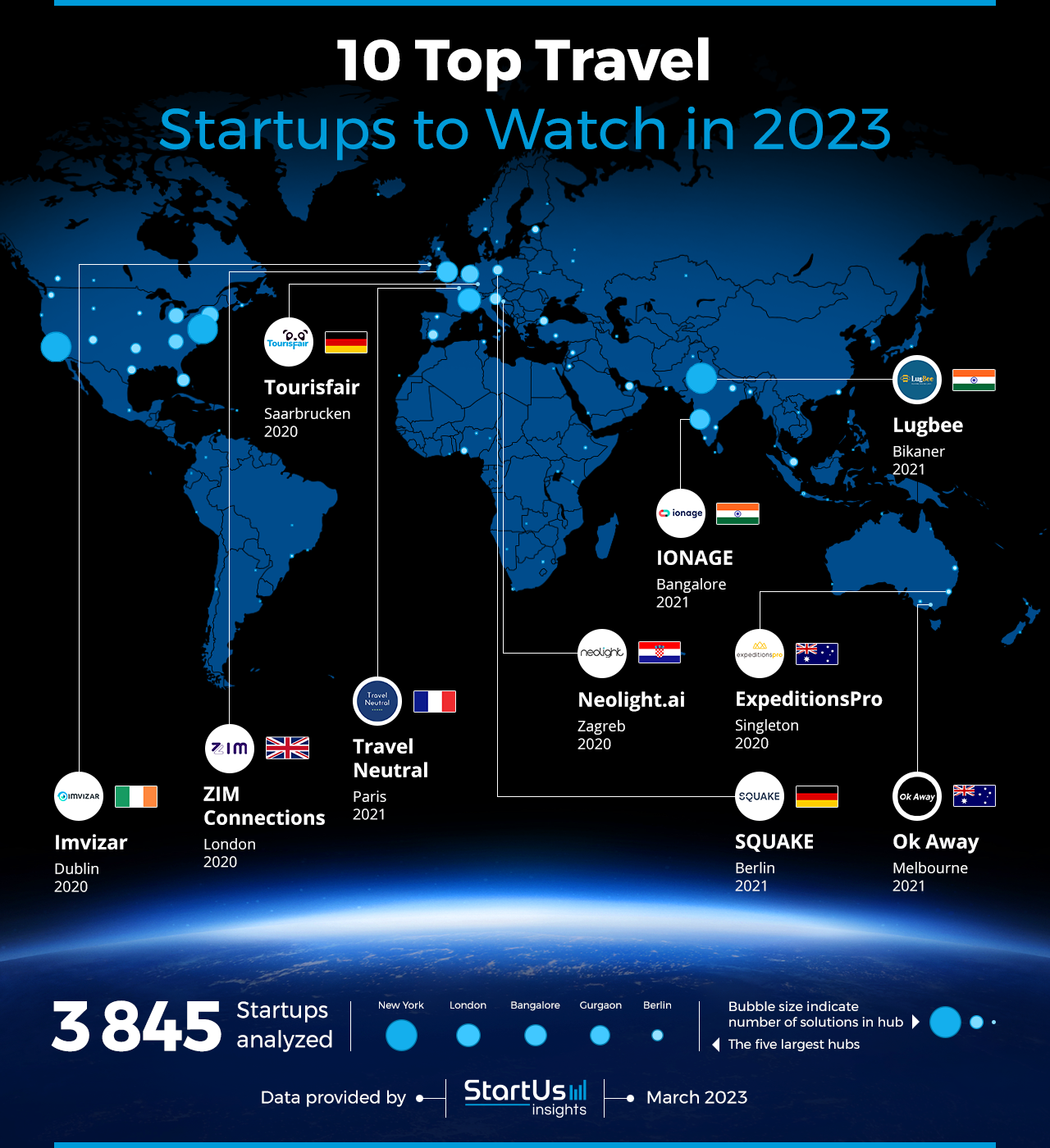
Click to download
- Tousifair – AI Travel Assistant
- Neolight.ai – AI-based Guest Management
- ExpeditionsPro – Virtual Reality (VR) Tour Platform
- Imvizar – Augmented Reality (AR) Tourism Platform
- SQUAKE – Carbon Compensated Travel
- Travel Neutral – Environmentally Conscious Travel
- Lugbee – Luggage Locker Network
- IONAGE – Unified Electric Vehicle (EV) Charging Management
- Ok Away – Location Sharing Application
- ZIM Connections – eSIM Marketplace
Tousifair develops an AI Travel Assistant

Tourisfair is a german startup that makes Pandi , an AI-driven travel assistant. It matches travelers with tourism activities based on their expectations and constraints. The assistant filters out unavailable activities and also ensures the availability of all recommended activities for the trip duration. This eliminates the need for extensive research, saving time for travelers. Moreover, Pandi allows travelers to modify their plans, add or remove activities, and change their itinerary at any time. This way, Tourisfair connects travelers with personalized experiences tailored to their interests, budget, and schedule.
ExpeditionsPro offers a Virtual Reality (VR) Tour Platform

Australian startup ExpeditionsPro offers a VR tour maker platform. It allows travelers to access a large collection of pre-existing 360-degree photo and video content. The startup also enables users to create and share immersive VR tours using their own content or existing tours from the Google Expeditions platform. The platform is compatible with Google Cardboard, tablets, and PCs, making it accessible to users with low-spec hardware. With its easy-to-use, drag-and-drop interface, ExpeditionsPro’s platform enables users to create their own 360-degree tours and share them with travelers around the globe.
Imvizar provides an Augmented Reality (AR) Tourism Platform

Imvizar is an Irish startup that develops an AR tourism platform. It enables users to create, upload and stream AR experiences for cultural and tourism purposes. Travelers use the startup’s companion smartphone app to access a variety of AR experiences. This enhances their visits to attractions, towns, and cities around the world. Imvizar also utilizes 3D scanning, photogrammetry, and spatial audio to create realistic and immersive AR content. Further, the startup allows users to share their own AR experiences with other users. Thus, Imvizar provides a new way for users to learn about different cultures and explore new places.
SQUAKE enables Carbon Compensated Travel

German startup SQUAKE develops an application programming interface (API) plug-in for carbon-compensated travel. It provides accurate carbon calculations and compensations for various forms of travel and transport activities, such as flights, car rides, hotel stays, and more. Its representational state transfer (REST) API enables travel and transport companies to calculate and compensate for their carbon emissions according to national and international standards. This helps companies achieve their sustainability goals by offering sustainable travel alternatives like replacing fossil jet fuel with sustainable aviation fuel (SAF). The API also integrates precise carbon calculations and compensation into travel booking flows, offering customers green choices, and reducing environmental impact.
Neolight.ai delivers AI-based Guest Management

Croatian startup Neolight.ai offers an AI-based guest management platform. It enables hotel operators and travel agencies to collect and analyze guest preferences and behavior data. The platform also allows them to communicate with travelers via chatbots on instant messaging platforms. Further, it manages reservations, check-ins, check-outs, and housekeeping in a single dashboard. To provide travel recommendations, the platform leverages natural language processing (NLP) and machine learning (ML). The platform offers an efficient solution for the travel and hospitality industries to ensure personalized experiences for their guests while optimizing operations and marketing efforts.

Travel Neutral empowers Environmentally Conscious Travel

Travel Neutral is a French startup that offers all-inclusive travel packages to minimize carbon emissions. It provides low-carbon vacations that are respectful of people, nature, and tradition. The startup does this by providing low-carbon transportation options, such as trains or electric vehicles (EVs), and eco-friendly accommodation choices, like solar-powered hotels or campsites. The startup also calculates and offsets the remaining carbon footprint of each trip by investing in verified environmental projects. This way, Travel Neutral allows travelers to discover new destinations without compromising on sustainability.
Lugbee builds a Luggage Locker Network

Indian startup Lugbee provides an online platform for travelers to find and book secure luggage locker options. It connects travelers with nearby cloakrooms that are available 24/7 and allows them to pay only for the hours they need. After storage, the startup seals the luggage with tamper-proof seals to ensure the safety of each bag. It also verifies and validates the stores that offer luggage storage, and offers 24/7 customer service. This way, Lugbee solves the problem of finding a reliable place to store luggage during travel excursions.
IONAGE provides Unified EV Charging Management

IONAGE is an Indian startup that offers a unified EV charging platform and charger networks. The startup’s app allows travelers to discover charging stations near them or along their route. It also enables them to plan their trip based on vehicle range and battery status. The platform enables them to charge their vehicles seamlessly with a unified payment system. Additionally, IONAGE has an intelligent trip planner that shows if an EV trip is possible with the range of the user’s vehicle. It provides details such as distance, time, cost, and battery status. IONAGE thus provides reliable and convenient access to charging infrastructure for travelers who use EVs.
OK Away makes a Location Sharing App

Australian startup Ok Away makes a location-sharing mobile app. It enables travelers to view each other’s mapped locations, addresses, local times, and phone battery levels on their devices. They also receive smart notifications for arrivals, departures, inactivity, and emergency events. Additionally, the startup promotes a missing pages initiative. It runs awareness campaigns for travelers missing worldwide using social media paid advertising. This way, OK Away enhances the safety and connectivity of travelers.
ZIM Connections builds an eSIM Marketplace

ZIM Connections is a UK-based startup that offers an eSIM marketplace for travelers who need a data connection when they arrive at a new destination. It allows users to choose from different providers, purchase a plan, and activate their new eSIM. Available in over 120 countries, it eliminates the hassle of swapping physical SIM cards and losing data coverage. Thus, ZIM Connections’ eSIM marketplace provides travelers with an easy and quick way to connect anywhere at any time.
Discover All Emerging Travel Startups
The travel startups showcased in this report are only a small sample of all startups we identified through our data-driven startup scouting approach. Download our free Travel Innovation Report for a broad overview of the industry or get in touch for quick & exhaustive research on the latest technologies & emerging solutions that will impact your company in 2023!
Your Name Business Email Company
Get our free newsletter on technology and startups.
Protected by reCAPTCHA and the Google Privacy Policy and Terms of Service apply.
Discover our Free Travel Report 21 pages
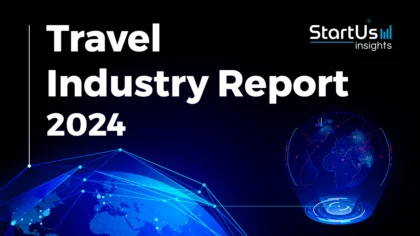
Travel 21 pages report
Mobility 22 pages report, telecommunication 21 pages report, circular economy 19 pages report.
Leverage our unparalleled data advantage to quickly and easily find hidden gems among 4.7M+ startups, scaleups. Access the world's most comprehensive innovation intelligence and stay ahead with AI-powered precision.
Get in touch
Your Name Business Email Company How can we support you? (optional)
Business Email

Protected by reCAPTCHA and the Google Privacy Policy and Terms of Service apply.
- Today's news
- Reviews and deals
- Climate change
- 2024 election
- Fall allergies
- Health news
- Mental health
- Sexual health
- Family health
- So mini ways
- Unapologetically
- Buying guides
Entertainment
- How to Watch
- My Portfolio
- Latest News
- Stock Market
- Biden Economy
- Stocks: Most Actives
- Stocks: Gainers
- Stocks: Losers
- Trending Tickers
- World Indices
- US Treasury Bonds
- Top Mutual Funds
- Highest Open Interest
- Highest Implied Volatility
- Stock Comparison
- Advanced Charts
- Currency Converter
- Basic Materials
- Communication Services
- Consumer Cyclical
- Consumer Defensive
- Financial Services
- Industrials
- Real Estate
- Mutual Funds
- Credit Cards
- Balance Transfer Cards
- Cash-back Cards
- Rewards Cards
- Travel Cards
- Student Loans
- Personal Loans
- Car Insurance
- Mortgage Calculator
- Morning Brief
- Market Domination
- Market Domination Overtime
- Asking for a Trend
- Opening Bid
- Stocks in Translation
- Lead This Way
- Good Buy or Goodbye?
- Fantasy football
- Pro Pick 'Em
- College Pick 'Em
- Fantasy baseball
- Fantasy hockey
- Fantasy basketball
- Download the app
- Daily fantasy
- Scores and schedules
- GameChannel
- World Baseball Classic
- Premier League
- CONCACAF League
- Champions League
- Motorsports
- Horse racing
- Newsletters
New on Yahoo
- Privacy Dashboard
Yahoo Finance
How a luggage startup still thrived during the pandemic when no one was traveling.
Monos , which touts itself to be the only climate neutral-certified luggage brand, is expanding into apparel after growing the brand successfully since its launch in 2019 and through the global pandemic—not just including but especially during the timeframe when hardly anyone was traveling.
Fortune recently spoke with CEO Victor Tam, chief creative officer Hubert Chan, and chief operating officer Daniel Shin—all cofounders of Monos—about pandemic travel and the near future for the travel industry.
The following interview has been condensed and lightly edited for clarity.
Fortune : What inspired you to launch Monos? What makes it stand apart from other luggage makers on the market?
Chan: We started Monos to create the luggage that we were searching for, but couldn’t find. As consumers ourselves, there are three criteria we look for when buying a product: design, quality, and accessibility. Looking at what was out there, there was plenty of cheap luggage with dated design and poor quality, as well as some that had decent design, but the quality was still not there. And of course, we found luggage that had good design and high quality, but the price was way out of reach for most people.
So there were plenty of brands that could hit one or even two of our criteria, but there wasn’t one that could actually hit all three. We knew that we could fill that gap, putting equal emphasis on timeless, thoughtfully considered design and high quality craftsmanship. And by selling directly to consumers, we’re able to bypass all the extra markups of traditional retail, allowing us to price our products very accessibly
Monos describes its luggage to be climate neutral-certified. Can you explain more about what that means and how you were able to achieve that status? What went into the research and development process for designing your luggage?
Tam: As one of the first luggage brands to be climate neutral-certified, we are committed to using our business as a force for good. From the timeless design of our products to the non-profit organizations we partner with, our aim is to tread lightly and have a positive impact on the world around us. In efforts to reduce our waste, we design our products to stand the test of time in both design and quality, ensuring that these travel pieces will accompany you on a lifetime of journeys. We are committed to being cruelty-free by sourcing the highest quality vegan alternatives to animal-derived materials for our bags and luggage tags.
We also choose packaging that is either recyclable or reusable, and ship your goods in the most efficient way possible, reducing the amount of packaging needed and carbon emissions generated. We pledge to continuously explore sustainable ways to protect our planet for many years to come.
One would imagine that the pandemic and ensuing lockdowns would be detrimental for any travel-related business. But that was not the case for Monos. What were sales like during the pandemic, and why do you think it went that way?
Tam: During the first two weeks of the pandemic, we saw our revenues drop 90%. Most days, we were actually in the negatives due to returns and cancellations.
However, that didn’t last long, as we rallied our team to pivot and design a new product called the Cleanpod UVC Sanitizer . This timely, highly relevant product did incredibly well for us, and we leveraged the success of this to keep marketing our luggage during a time when all our competitors had stopped. By the end of 2020, we were not only surviving, but thriving, closing out the year with 500% growth over 2019.
When travel seemingly resumed this spring after more Americans received their second doses of the COVID-19 vaccine—and the expected summer of "revenge travel" (meaning people traveling as much as possible after more than a year of lockdown and staying home)—did affect business at all? Do you think the Delta variant might affect any plans of yours?
Tam: We did see business pick up, but navigating the travel space right now is like walking on a tightrope. Any sort of optimism and we see a rise in sales, but it’s a double-edged sword. As soon as there’s bad news about variants or outbreaks, we also feel it right away. But what we do know is that throughout the pandemic (even during the height of it), we still had people that fell in love with our brand and were still buying our luggage with the hopes of travel in the future. So we’re optimistic that we’ll be very well positioned when travel does come back in full force.
Monos is now expanding into apparel. What motivated the expansion and what kind of products can customers expect?
Chan: Our Everywear collection started out with us thinking about how travel is a whole-body experience that engages all our senses, and touch and comfort is a big part of that. Beyond just travel wear for long flights and exploring new places, we wanted to create classic, comfy, functional garments that would be equally suited for everyday life at home too, especially now with working from home becoming much more commonplace. We see Monos as a travel lifestyle brand, not just a luggage brand.
And our vision is to expand the definition of travel beyond just the narrow, very literal sense of hopping on a plane or train to go to a new destination. For example, a smell or a taste or a feeling has the ability to transport you to a different time and place too—to us, this is also a form of travel, but in a different way. Beyond just physically moving from point A to point B, travel is as much a personal journey as it is a physical one. And we want to continue exploring these intersections of travel and lifestyle through strategic expansions into new product categories
This story was originally featured on Fortune.com
- INSIDER REVIEWS
- TECH BUYING GUIDES
- miscellaneous
7 startups making cool backpacks for adults - from $40 basics to $900 splurges

This bag company founded in 2013 doesn't just make cool backpacks for the sake of doing so. With each purchase, it donates a backpack filled with school supplies to a student in need. The founders created the brand after seeing kids carrying their school things in ripped trash bags to their prior venture, a non-profit summer camp. Now, they help you carry your essentials in sleek leather, canvas, and nylon styles while supporting underprivileged kids and raising conversations around social issues.
What to buy:
- Nevins in Wool Panel Olive, $95
- Spencer in Cotton Canvas Navy, $100.75
- Kane in Smooth Black Leather, $224.25
- Wythe in Professional Black, $235
Learn more about STATE Bags:
- You can't walk around New York City without seeing these backpacks — which is why most people won't believe they start at $40
- 29 companies to shop from that give back all year long — not just around the holidays
Dagne Dover
Whenever we see a dark or dusty neoprene backpack out in public, we place a big bet that it's from Dagne Dover. These backpacks have become a favorite among urbanites who need a comfortable and well-organized bag they can carry from night to day. Since they're made from 100% premium neoprene, they're insulating and shock-absorbent, so you know your stuff will always be protected. If you're adventurous, choose the bright Sienna and Liberty colors, or the cute Camo prints.
- Dakota Backpack, available in three sizes and 12 colors, from $135
Learn more about Dagne Dover:
- Finally, someone made a work-appropriate backpack that makes sense for professional women
- This $155 laptop bag is one of the smartest we've ever carried to work — here's why professionals will love it
- This tote that keeps selling out is the ultimate work bag for professional women
- A popular handbag startup is behind the perfect office-appropriate gym bag for men and women alike
Athleisure often revolves around clothing, but gym-bag startup Caraa focuses on the all-important backpack. It creates fashionable, versatile, and durable bags you won't be afraid to set on the ground or fill with sweaty clothes, including the famous and distinctive Studio Bag, which can be turned into a satchel, backpack, or crossbody with a switch of the straps. The bags are designed to perform, with breathable compartments, moisture wicking materials, and built-in USB chargers, to name a few features, and they look great.
- Stratus in Black, $195
- Sport Tote, $295
- Studio 2 Medium in Oxblood Blush, $395
- Studio Bag with Gold Hardware, $395
Learn more about Caraa:
- This $200 backpack from an up-and-coming athleisure startup is the only one anyone needs — here's why
- 9 convertible backpacks that can easily transition into tote bags, duffels, or briefcases
- The best convertible backpacks that turn into tote bags
Matt & Nat makes composed and structured bags that also happen to be vegan. In addition to vegan leather, it uses recycled nylon, cork, and rubber in its bags, and all of its bag linings have been made from 100% recycled bottles since 2007. The backpacks are unique enough in color and silhouette to distinguish yourself from the pack, yet still simple and timeless — a design philosophy that encourages sustainable, long-term use.
- Kiara, $112
- Mercy, $140
- Brave, $150
Learn more about Matt & Nat:
- This startup's vegan leather bags could fool anyone into thinking they're real — and they're all under $200
We thought spending at least $700 on a backpack was slightly ridiculous, too, until we actually felt and wore one in person. Available in four finishes and a rotating lineup of curated colors, the 100% Italian leather bags are simply gorgeous. The brand reimagines luxury by also making beauty practical. On the inside, you'll find large padded compartments for laptops or tablets and small pockets for your essentials. If you ever tire of wearing it as a backpack, it can be converted to over-the-shoulder, on-the-arm, and crossbody configurations.
- Mini Maestra, from $695
- Midi Maestra, from $795
- Maestra, from $895 (fits a 13-inch laptop)
Learn more about Senreve:
- This Instagram-famous convertible backpack and shoulder bag is $900 — I thought the price was ridiculous until I actually used it
- This startup's luxury leather bags are all over Instagram — here's why women love them so much
- 5 work bag startups every woman should know
You might know Baggu as the company behind the $10 reusable nylon bags people tote as casual day bags or grocery bags. Its backpacks, available in a variety of materials like velvet, canvas, and of course, nylon, are also worth your attention. The tiny backpacks are a light, cute companion for window shopping and museum visits, and its roomy drawstring bags make a practical everyday accessory. Best of all, most of its styles are under $50. If you don't want to spend too much, shop at Baggu.
- Canvas Mini Backpack in Lilac, $39
- Drawstring Backpack in Natural Grid, $42
- Mini Backpack in Indigo Velvet, $43
- Work Backpack in Taupe Nubuck, $170
Learn more about BAGGU:
- People are obsessed with these $10 reusable nylon tote bags that hold 50 pounds of stuff and fit in your back pocket
Minimalism, quality, and transparent pricing are the tenets of Everlane's business. In backpack form, this means clean designs, durable and travel-friendly construction, and affordable, under-$100 prices. With its eight pockets, water-resistant covering, and easy-access side zipper, the Commuter Backpack is a fan favorite, but the company is also experimenting with convertible formats, as shown through its Mover Pack, a hybrid duffel bag-backpack.
- The Nylon Commuter Backpack, $68
- The Mover Pack, $78
- The Modern Snap Backpack, $80
Learn more about Everlane:
- Everlane's new $80 convertible travel bag can be carried as a duffel or a backpack — and it holds more than enough for all your weekend trips
- 19 styles from Everlane that we wear in our everyday lives — for both men and women
- I’ve tried a lot of backpacks, but these are my favorite ones
- The best backpacks you can buy
Get your weekly dose of essential news delivered right to you, plus explore a world of insights with our diverse newsletter subscription options.
- Weekly newsletter
- Uncover the latest in Tech, Finance, Business, and more
- Handpicked web stories, in-depth articles, and expert analyses
Advertisement

COMMENTS
Despite that, some travel startups are still growing exponentially. Check out this list of companies that are looking to revitalize the travel industry in 2024 and beyond. 1. TravelPerk.
Starting with the Pakt One minimalist carry-on travel bag, our company creates responsibly sourced minimalist travel gear to inspire action on environmental issues. Our travel bags are created by experienced travelers for experienced travelers, with all the features you'd want and none you don't.
Made of ultralight, water-resistant nylon, this bag fits in the palm of your hand but is ready for adventure at the drop of a hat. Even though we design our gear for the outdoor adventurer, our fans also use our bags in everyday use, from the gym to their kids soccer games.
Are you looking for the latest advances in the travel sector? Explore the innovative solutions from the 10 hand-picked startups that we feature in this Travel Startups to Watch in 2023 article. They work on AI travel assistants, low-carbon travel, VR-based tourism, luggage protection, and much more!
Sun, Sep 12, 2021, 7:00 AM 5 min read. Monos, which touts itself to be the only climate neutral-certified luggage brand, is expanding into apparel after growing the brand successfully since its...
7 startups making cool backpacks for adults - from $40 basics to $900 splurges. Slideshows 1 min read. STATE Bags. Shop backpacks at STATE Bags here. This bag company founded in 2013...